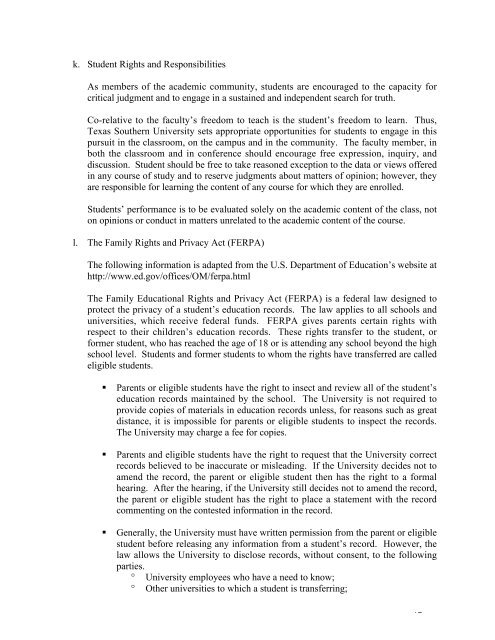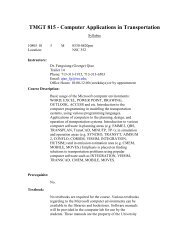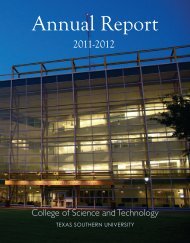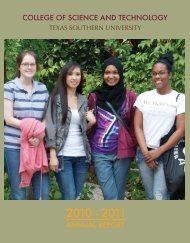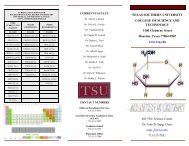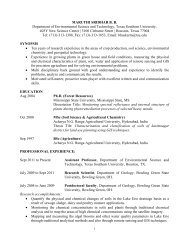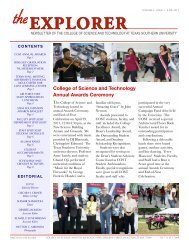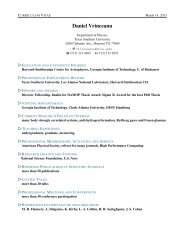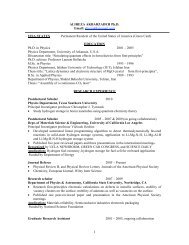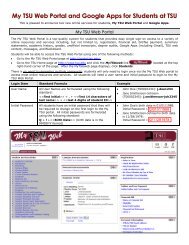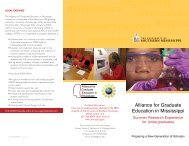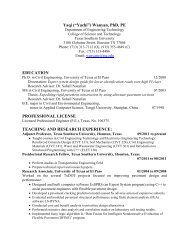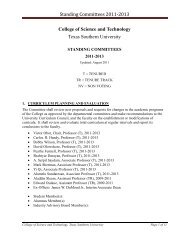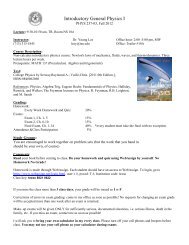Faculty Manual - COST Home Page - Texas Southern University
Faculty Manual - COST Home Page - Texas Southern University
Faculty Manual - COST Home Page - Texas Southern University
Create successful ePaper yourself
Turn your PDF publications into a flip-book with our unique Google optimized e-Paper software.
k. Student Rights and Responsibilities<br />
As members of the academic community, students are encouraged to the capacity for<br />
critical judgment and to engage in a sustained and independent search for truth.<br />
Co-relative to the faculty’s freedom to teach is the student’s freedom to learn. Thus,<br />
<strong>Texas</strong> <strong>Southern</strong> <strong>University</strong> sets appropriate opportunities for students to engage in this<br />
pursuit in the classroom, on the campus and in the community. The faculty member, in<br />
both the classroom and in conference should encourage free expression, inquiry, and<br />
discussion. Student should be free to take reasoned exception to the data or views offered<br />
in any course of study and to reserve judgments about matters of opinion; however, they<br />
are responsible for learning the content of any course for which they are enrolled.<br />
Students’ performance is to be evaluated solely on the academic content of the class, not<br />
on opinions or conduct in matters unrelated to the academic content of the course.<br />
l. The Family Rights and Privacy Act (FERPA)<br />
The following information is adapted from the U.S. Department of Education’s website at<br />
http://www.ed.gov/offices/OM/ferpa.html<br />
The Family Educational Rights and Privacy Act (FERPA) is a federal law designed to<br />
protect the privacy of a student’s education records. The law applies to all schools and<br />
universities, which receive federal funds. FERPA gives parents certain rights with<br />
respect to their children’s education records. These rights transfer to the student, or<br />
former student, who has reached the age of 18 or is attending any school beyond the high<br />
school level. Students and former students to whom the rights have transferred are called<br />
eligible students.<br />
Parents or eligible students have the right to insect and review all of the student’s<br />
education records maintained by the school. The <strong>University</strong> is not required to<br />
provide copies of materials in education records unless, for reasons such as great<br />
distance, it is impossible for parents or eligible students to inspect the records.<br />
The <strong>University</strong> may charge a fee for copies.<br />
Parents and eligible students have the right to request that the <strong>University</strong> correct<br />
records believed to be inaccurate or misleading. If the <strong>University</strong> decides not to<br />
amend the record, the parent or eligible student then has the right to a formal<br />
hearing. After the hearing, if the <strong>University</strong> still decides not to amend the record,<br />
the parent or eligible student has the right to place a statement with the record<br />
commenting on the contested information in the record.<br />
Generally, the <strong>University</strong> must have written permission from the parent or eligible<br />
student before releasing any information from a student’s record. However, the<br />
law allows the <strong>University</strong> to disclose records, without consent, to the following<br />
parties.<br />
<strong>University</strong> employees who have a need to know;<br />
Other universities to which a student is transferring;<br />
45


